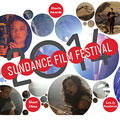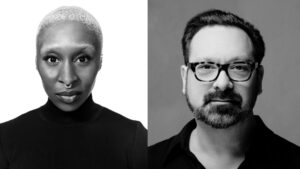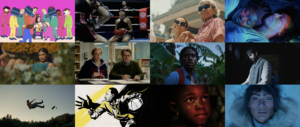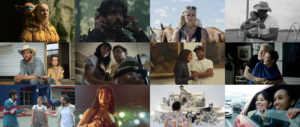Crystal Ortbahn
Crystal Orbahn, Samantha Ricci, Marcela Toledo
As part of the Sundance Film Festival’s national student outreach, full-time undergraduate and graduate students currently enrolled at a college or university are granted special access to films, panels, and events as part of the Film School Pass. Below, discover experiences documented by three students at the 2014 Sundance Film Festival.
Through the Student Lens
By Crystal Ortbahn
On my first full day at the Festival, I met a volunteer who led me to the Filmmaker Lodge, knowing there would be food and coffee – always a plus for the weary traveler. The coffee was fresh and delicious, but the panel, titled “Docs Gone Wild,” fueled my excitement for the rest of the Festival. Here were people, like me, willing and wanting to tell stories in innovative ways. Here were people engaging in and playing with emotional truths, searching for what’s interesting, and following their gut feelings. Here I was, a curious student, fresh off a shuttle from Salt Lake City and eager to learn about storytelling. What a great place to be.
Stories are always around us, but this couldn’t be more true than at the Sundance Film Festival. Stories live here. Jane Pollard (20,000 Days on Earth) commented that stakes and risks are interesting in documentary filmmaking; they create a style of rawness in documentary filmmaking, and the results can be visually arresting. Tim Sutton (Memphis) commented that he’s interested in creating worlds. These filmmakers took chances in their filmmaking and their work allowed the stories to come to life in new lights on screen.
I loved being able to hear these filmmakers talk about real stories they captured in their own documentaries. It was comforting to know that the next documentaries are seeded in the aspiring cinematographer from Arizona, the director from South Africa, the actor from California, the screenwriter from Florida, and the curious student from South Dakota. The documentary panel proved that dedication to storytelling can bloom into great film.
Thank you, mustached Festival volunteer, for leading me to coffee and an inspiring conversation.
Filmmaker Speed Dating at the 2014 Festival
By Samantha Ricci
After ten vibrant days, the festival is over, and I have returned home. I’ve never experienced anything like Sundance before, and, even if I go again, I don’t know if it will ever be the same. I came with a class focused specifically on the Festival and independent film, and that changed how I experienced my ten days.
The first few days, I had trouble figuring out how to balance eating and sleeping and watching all of the movies I wanted to see. I had to see 15 for my class, but I ended up seeing a grand total of 23 out of the 100+ feature films. By the end of the Festival, I was a champ, watching up to four movies a day.
I think my favorite thing about Sundance is the opportunity to be around writers, actors, producers, directors, and film lovers. You can strike up a conversation with almost any stranger because you have this mutual interest in art. There’s a community of creativity at Sundance.
In addition to Q&A sessions, I found exciting people in mundane places. I saw Jack McBrayer walking down the street one morning with a coke in hand. I rode a bus later that day that had the creators of Park City Midnight’s Signals and the stars of NEXT’s Foxy Merkins on it. Göran Olsson, director of Black Power Mixtape and this year’s Concerning Violence, gave simple gifts to the attendees of his premiere with his own hands. All of this reminds you that filmmakers are real, living people in the world, and it gives you an insight into how work can be made. It makes you realize that you could be one of them if you put in the effort.
In that same vein, I got the special opportunity to attend filmmaker speed dating. My table got to talk to the co-producers of The Sleepwalker, the co-producers of To Be Takei, the director of I Think This Is the Closest to How the Footage Looked, and the director of one of my favorite movie experiences at the festival, The Foxy Merkins. This last film was written through collaborative automatic writing––something I’ve workshopped myself––and featured the bravest scene I’ve seen from an actress in any medium.
Madeleine Olnek, the director of Foxy, was like a cannon of good energy to the face. She took notes on our names and cared about who we were and what we were interested in. She told us that anyone could make a film, and encouraged us to tell the stories that mattered to us.
As an English and Theatre double major, I’m studying how to convey stories, and I have a lot of stories I want to tell. I thank Sundance for inspiring me to try to tell more of them.
Sundance, A Film Student Paradise
By Marcela Toledo
Coming to Sundance is becoming an addiction. It is not only because of the cozy small Victorian town surrounded by snow-covered mountains, but also the magic and camaraderie that flows throughout Park City during the Festival. Here is where dreams come true—not only for filmmakers, but also for students where age doesn’t matter.
This is the second year that I have attended Sundance as an MFA student from CSULA. Running around town in and out of theatres with my friend Roya who, like me, is not a traditional student, was a delight. She’s 42; I’m 48. For both of us, English is not our native language; she’s from Iran and I’m from Mexico City. But by the fourth day of the film festival, we were movie’d out.
As students we had direct access to directors, producers, and other film industry members who shared invaluable tips and offered a behind the scenes look at this most prestigious American film festival. Yes, Sundance is my paradise. Watching at least three films a day created a distinct sense of a guild. Walking on the streets, standing in line, on the bus or under the same roof watching independent movies with people who love movies as much or more than I love them is a unique feeling.
The sensitivity captured in every film moves and fills my soul with faith and pride for being there. It reinforces in me the respect, appreciation, and fraternity for society and life in general. This is especially true for the filmmakers, who fervently create, recreate and transport the joys or sorrows that make me laugh or cry.
Sadly, I came back home before the Festival ended, but I returned determined to finish my script to apply for the Sundance Institute Screenwriters Lab. There is no other way. Things do not happen by themselves; you have to make them happen. As industry panelist Janet Heng, an agent from WME, promised, “If you are good, we will find you.”




